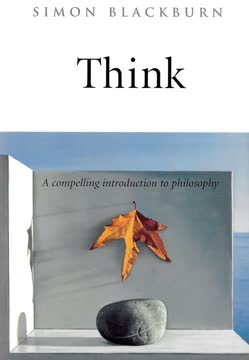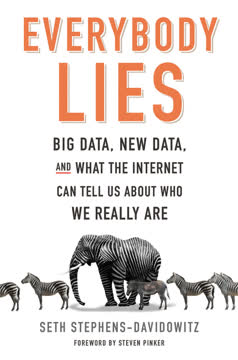Key Takeaways
1. Big Data Unveils Human Behavior Patterns
Data takes too much of the guesswork out of the sell.
Data as a mirror. Big data, collected from various online platforms, provides unprecedented insights into human behavior. It reveals patterns in our preferences, biases, and decision-making processes that were previously hidden or only speculated upon.
Unintended revelations. Often, the most valuable insights come from data that wasn't intentionally collected for that purpose. For example:
- Google search trends reveal societal attitudes towards race and sexuality
- Social media interactions expose relationship dynamics and social hierarchies
- Online purchasing habits reflect economic trends and consumer psychology
Ethical considerations. While this wealth of data offers immense potential for understanding human behavior, it also raises important questions about privacy, consent, and the potential for manipulation. Researchers and companies must navigate these ethical challenges as they harness the power of big data.
2. Online Dating Reveals Surprising Truths About Attraction
Beauty operates on a Richter scale.
Quantifying attraction. Online dating platforms provide a unique opportunity to analyze human attraction patterns on a massive scale. The data reveals some counterintuitive findings:
- Physical attractiveness follows an exponential distribution, not a normal one
- Men of all ages tend to prefer women in their early 20s
- Women generally prefer men close to their own age
Beyond physical appearance. While physical attributes play a significant role, the data also shows the importance of other factors:
- Shared interests and values significantly increase match likelihood
- Communication style and effort in messaging affect response rates
- Profile content and self-presentation strategies impact attractiveness ratings
Cultural implications. These findings challenge some commonly held beliefs about attraction and dating, and have implications for how we understand relationships in the modern era.
3. Race and Ethnicity Still Significantly Impact Social Interactions
Data science is far from perfect—there's selection bias and many other shortcomings to understand, acknowledge, and work around.
Persistent biases. Despite progress in many areas, data from online platforms reveals that race and ethnicity continue to play a significant role in social interactions:
- Dating site data shows clear racial preferences in messaging and response rates
- Social media analysis exposes patterns of racial segregation in online networks
- Language use and cultural references vary significantly across racial groups
Quantifying discrimination. Big data allows researchers to measure the extent of racial bias in various contexts:
- Job application responses based on name ethnicity
- Housing discrimination in online rental markets
- Differences in online ad targeting based on perceived race
Challenging assumptions. While some findings confirm existing theories about racial dynamics, others challenge our assumptions and reveal more nuanced patterns of interaction across racial lines.
4. The Internet Amplifies Both Connection and Conflict
We're living through writing's Cambrian explosion, not its mass extinction.
Digital tribalism. The internet has created new ways for people to connect based on shared interests and identities:
- Online communities form around niche topics and subcultures
- Social media platforms facilitate global connections and movements
- Digital spaces can provide support and belonging for marginalized groups
Amplified conflict. However, the same technologies that enable connection also intensify conflict:
- Echo chambers and filter bubbles reinforce existing beliefs
- Anonymity and distance can lead to more extreme expressions of hostility
- Viral misinformation spreads faster than ever before
New forms of discourse. The internet has fundamentally changed how we communicate:
- Memes and hashtags as powerful tools for spreading ideas
- Real-time global conversations around breaking news and events
- Emergence of new linguistic patterns and digital dialects
5. Language Evolution in the Digital Age
Twitter gives us a sense of words not only as the building blocks of thought but as a social connector.
Rapid linguistic change. The digital age has accelerated the evolution of language:
- New words and phrases emerge and spread rapidly online
- Abbreviations and emoji become part of everyday communication
- Platform-specific linguistic norms develop (e.g., Twitter's character limit)
Data-driven analysis. Big data allows linguists to track language changes in real-time:
- Corpus analysis of social media posts reveals emerging trends
- Sentiment analysis tools detect shifts in word connotations
- Geographic data shows regional variations in online language use
Implications for communication. These changes have broad implications:
- Challenges for machine translation and natural language processing
- Potential gaps in understanding between generations or digital/non-digital natives
- Opportunities for more nuanced and expressive digital communication
6. Personal Branding: The New Currency of the Internet Era
Technology is our new mythos.
Digital identity creation. The internet has made personal branding a necessity for many:
- Social media profiles as curated representations of self
- Online portfolios and personal websites as professional calling cards
- Influencer culture turning individuals into marketable brands
Metrics of influence. New measures of social capital have emerged:
- Follower counts and engagement rates as indicators of influence
- Klout scores and similar metrics attempting to quantify online impact
- The rise of "micro-celebrities" in niche online communities
Authenticity vs. curation. Personal branding creates tension between authentic self-expression and strategic self-presentation:
- Pressure to maintain a consistent online persona
- Balancing privacy concerns with the need for visibility
- The psychological impact of constant self-promotion
7. Privacy Concerns in the Age of Data Collection
We brought on the flood—will it drown us or lift us up?
Ubiquitous data collection. Nearly every online action generates data:
- Browsing history and search queries
- Location data from mobile devices
- Purchase history and financial transactions
- Social media interactions and content
Privacy trade-offs. Users often exchange privacy for convenience or free services:
- Personalized recommendations and targeted advertising
- Improved user experiences through data-driven design
- Free access to platforms in exchange for personal data
Ethical and legal challenges. The scale of data collection raises important questions:
- Who owns the data generated by users?
- How can individuals maintain control over their personal information?
- What are the limits of acceptable data use by companies and governments?
8. Data Science Reshapes Our Understanding of Identity
Here we're going to layer identity, emotion, behavior, and belief over our physical spaces and see what new understandings emerge.
Quantifying the self. Data science provides new ways to measure and understand identity:
- Personality assessments based on digital footprints
- Behavioral patterns revealed through smartphone usage
- Social network analysis exposing hidden group dynamics
Fluid and multifaceted identities. Big data reveals the complexity of human identity:
- Individuals present different personas across various online platforms
- Identities shift and evolve over time, traceable through longitudinal data
- Intersectionality becomes more visible through multi-dimensional data analysis
Challenging traditional categories. Data-driven insights often defy conventional wisdom:
- Gender differences may be less pronounced than commonly believed
- Cultural boundaries are more porous and fluid in online spaces
- New forms of community and belonging emerge that transcend geography
Human Contributions:
This summary was created by a human based on the book "Dataclysm" by Christian Rudder. While it aims to capture the key ideas and insights from the book, it is an interpretation and may not fully represent the author's original intentions or arguments. Readers are encouraged to refer to the full book for a comprehensive understanding of the topics discussed.
Last updated:
FAQ
What's Dataclysm: Who We Are about?
- Exploration of Big Data: Dataclysm by Christian Rudder examines the implications of Big Data, particularly how it reveals human behavior when people think no one is watching. It uses data from online platforms, especially OkCupid, to analyze social interactions and personal preferences.
- Human Behavior Insights: The book provides insights into attraction, race, and social dynamics, aiming to offer a deeper understanding of ourselves through data analysis.
- Sociological Perspective: Rudder emphasizes understanding societal trends and individual behaviors through quantitative analysis, offering a comprehensive view of human interactions.
Why should I read Dataclysm: Who We Are?
- Unique Data Analysis: The book offers a fresh perspective on human behavior by utilizing vast amounts of data from dating profiles and social media, providing insights often overlooked in traditional social science.
- Challenging Assumptions: Rudder challenges common assumptions about race, beauty, and attraction, encouraging readers to reconsider their own biases and perceptions.
- Engaging Writing Style: With accessible and engaging writing, Rudder makes complex data relatable and understandable, using humor and personal anecdotes to keep readers invested.
What are the key takeaways of Dataclysm: Who We Are?
- Data Reflects Reality: The book illustrates how data can reveal truths about human behavior that are often hidden or ignored, emphasizing the importance of understanding data.
- Racial Bias in Dating: Rudder highlights pervasive racial biases in online dating, showing systemic issues within dating culture.
- Beauty and Attraction: The book discusses the significant impact of physical attractiveness on social interactions, noting that small differences in attractiveness can lead to vastly different social outcomes.
What are the best quotes from Dataclysm: Who We Are and what do they mean?
- "The beauty myth is always actually prescribing behavior and not appearance.": This quote highlights how societal standards of beauty influence behavior and expectations, not just appearance.
- "When people are getting sick, they search for symptoms and remedies.": It illustrates the predictive power of data in identifying trends, such as health crises, based on search behavior.
- "Racism isn't a problem of outliers. It is pervasive.": This statement reflects the systemic nature of racial bias, calling for broader recognition of systemic racism.
How does Christian Rudder use data from OkCupid in Dataclysm: Who We Are?
- Analyzing User Interactions: Rudder uses OkCupid data to analyze user interactions, focusing on preferences, ratings, and messaging patterns to provide insights into attraction and social dynamics.
- Comparative Studies: The book compares behaviors of different racial and gender groups, revealing patterns in perception and interaction.
- Real-World Applications: Rudder applies findings from OkCupid to broader societal issues, demonstrating how online behavior reflects real-world attitudes.
What is the significance of "Wooderson's Law" in Dataclysm: Who We Are?
- Age Preferences in Dating: Wooderson's Law observes that men prefer younger women as they age, while women's preferences remain closer to their own age, highlighting differing expectations in dating.
- Statistical Analysis: Rudder uses data to illustrate this phenomenon, providing a clearer understanding of dating dynamics.
- Cultural Commentary: The law serves as a commentary on societal norms regarding age and attractiveness, prompting reflection on personal dating preferences and biases.
How does Dataclysm: Who We Are address the topic of race?
- Racial Bias in Online Dating: The book discusses racial biases in online dating, revealing systemic discrimination through data analysis.
- Comparative Analysis: Rudder compares experiences of different racial groups on dating platforms, highlighting disparities in treatment.
- Cultural Implications: The discussion extends beyond dating, encouraging readers to consider how biases affect broader societal interactions.
What role does beauty play in Dataclysm: Who We Are?
- Impact of Attractiveness: The book emphasizes that physical beauty significantly influences social interactions, with small differences in attractiveness leading to vastly different outcomes.
- Gender Disparities: Rudder highlights that beauty affects women more profoundly than men, underscoring societal pressures on women regarding appearance.
- Cultural Commentary: The discussion critiques societal standards and their influence on individual experiences, encouraging reflection on perceptions and interactions.
How does Christian Rudder use Google Trends in Dataclysm: Who We Are?
- Understanding Public Sentiment: Rudder uses Google Trends to analyze public sentiment and behavior, particularly regarding sensitive topics like race and health.
- Tracking Racial Attitudes: By examining search data, Rudder reveals patterns of racial animus and their correlation with significant events.
- Predictive Capabilities: The use of Google Trends demonstrates the predictive power of data analysis, highlighting its importance in understanding human behavior.
What is the "online disinhibition effect" mentioned in Dataclysm: Who We Are?
- Behavioral Changes Online: The online disinhibition effect refers to individuals feeling less restrained in their behavior online, leading to more extreme expressions of opinion and emotion.
- Anonymity and Audience: Anonymity and the presence of an audience contribute to this effect, allowing people to express thoughts they might otherwise suppress.
- Implications for Social Media: This effect has significant implications for communication on social media, often resulting in heightened negativity and aggression.
How does Dataclysm: Who We Are explore the impact of social media on relationships?
- Changing Communication Styles: Rudder examines how social media has transformed communication and relationship formation, highlighting the shift from traditional dating to online interactions.
- Visibility and Acceptance: The book discusses social media's role in increasing visibility for marginalized groups, emphasizing the importance of representation.
- Cultural Shifts: Rudder explores how social media reflects and shapes cultural attitudes toward relationships, encouraging consideration of the broader implications of online interactions.
What are the implications of the findings in Dataclysm: Who We Are?
- Understanding Human Behavior: Insights from data analysis can help individuals and society better understand human behavior and relationships.
- Challenging Prejudices: The book urges readers to confront biases and assumptions about race, gender, and attraction.
- Future of Relationships: Rudder suggests that relationships will continue to evolve with technological advances, encouraging mindfulness of the human experiences behind the data.
Review Summary
Dataclysm receives mixed reviews, with readers praising its engaging writing style and fascinating insights into human behavior based on big data analysis. Many find the book entertaining and thought-provoking, particularly regarding online dating trends and societal biases. However, some critics argue that the data is limited and potentially skewed, questioning the validity of certain conclusions. Readers appreciate the book's accessibility but note that it sometimes lacks depth and cohesion. Overall, it's considered an interesting, if not groundbreaking, exploration of how digital data reveals human nature.
Similar Books






Download PDF
Download EPUB
.epub digital book format is ideal for reading ebooks on phones, tablets, and e-readers.




